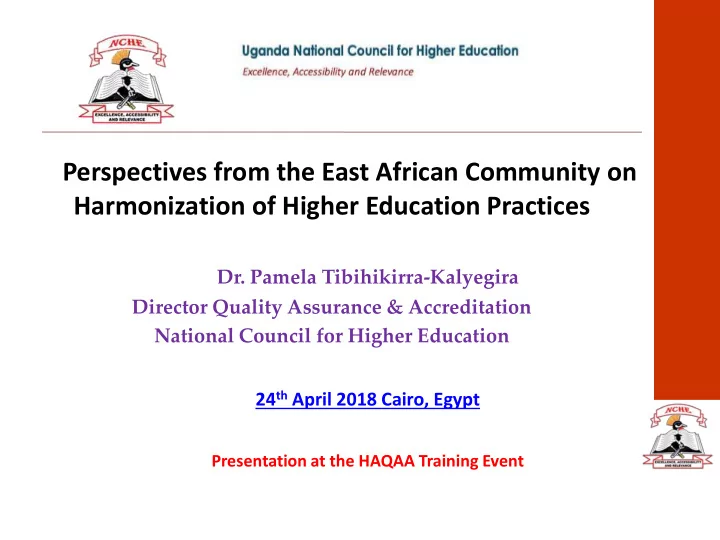

Perspectives from the East African Community on Harmonization of Higher Education Practices Dr. Pamela Tibihikirra-Kalyegira Director Quality Assurance & Accreditation National Council for Higher Education 24 th April 2018 Cairo, Egypt Presentation at the HAQAA Training Event
Presentation Structure • Historical Perspective of Higher Education in East Africa • The Ugandan Scenario • Practices of QA Systems in East Africa • Challenges • The Case for Continental Standards and Guidelines
Historical Perspective • Higher Education is considered to play a unique role in East African Regional Cooperation with its roots tracing back to 1922 when a Technical College was established at Makerere Hill, Kampala, Uganda offering various courses. • This College expanded over the years to become a Centre for Higher Education in East Africa and beyond in 1935 offering programmes under the University of London
Historical Perspective Con’t • In 1967 the East African Community was set up as a regional intergovernmental organisation under which the 3 countries namely Uganda, Kenya and Tanzania, established the University of East Africa at Makerere College (Uganda), Dar es Salaam University College (Tanzania) and Nairobi University College (Kenya). • Following the collapse of the East African Community in 1977, the three University Colleges were established as independent and fully-fledged Universities.
Historical Perspective Con’t • After 1977, these three universities continued to cooperate in a number of ways under the umbrella of the Inter-University Council for East Africa (IUCEA), one of the surviving institutions of the East Africa Community. • The IUCEA has since risen to assume a broader role as a central pillar for sustainable regional integration with its mandate to foster development of higher education and research for socio-economic development with the East African region
The Ugandan Scenario • Until late 1990s, there was only (1) University, Makerere • However, the forces of globalization and Internationalization in the 1990s led to greater interest in Higher Education • There was demand to increase access to higher education at all levels • Uganda Gross Enrolment Ratio 2000: 2016 : Africa : Mauritius: Developed world 3.8%: 6.8% : 15% : 25% : >40% • It meant then that business couldn‘t remain as usual; there was need to have other providers of Higher Education in addition to Makerere University and a few government public institutions
Ugandan Scenario Con’t • Consequently, provision of Higher Education was liberalized and the enactment of the Universities and Other Tertiary Institutions Act 2001[amended 2003 and 2006] established the legal framework. - Both the Public and Private Higher Education Institutions could be set up - The funding strategies also changed tremendously with private financing of Higher Education - Concerns on the quality of training became paramount
Mandate of NCHE • Regulating and guiding the establishment and management of institutions of Higher Learning • Regulating the quality of Higher Education, equating qualifications and advising Government on Higher Education issues
Some of the Functions of NCHE i) To promote and develop the processing and dissemination of information on Higher Education for the benefit of the people; ii) To advise the Minister on the establishment and accreditation of public and private institutions of Higher Education iii) To receive, consider and process applications for the establishment and accreditation of HEIs including academic and professional programmes (See www.unche.or.ug for the other functions)
Practices of QA Systems in East Africa The EAC (Founded 1967, collapsed 1977 & re- established under Treaty 2000) now comprises 6 countries: Uganda, Tanzania, Kenya, Rwanda, Burundi and South Sudan). Their Higher Education is set up as follows: • Existence of Higher Education Regulatory Agencies created by an Act of Parliament in all the member states • The revitalization of the IUCEA enabled the development of processes aimed at harmonizing higher education provision.
Example of the Practices • The harmonized East African Higher Education Area for recognition of academic outcomes • Development of Benchmarks (reference points for comparability of competencies) • The Self-Assessment and Peer Evaluation practices (both programmatic and institutional) – these are guided by the Handbook for Quality Assurance Volumes (1-4). • (These resources are available online @ www.iucea.org)
Example of the Practices Con’t • The central tenets of the IUCEA Qualifications Framework for Higher Education:- - Recognition of Prior Learning - Credit Accumulation and Transfer System (CATS) - Staff and Student Exchange programmes - Etc.
Challenges By the Training Institutions • Skepticism about the benefits of common standards (fear of exposure of their weaknesses etc.) • Inability to properly customize the IUCEA assessment tools for individual institution • Inadequate funding and other supporting resources for the institutions to undertake self- assessment and peer reviews
Challenges By the Practitioners • Lack of adequate numbers of qualified practitioners • Inadequate funding and other supporting resources for the exercise
The Case for Continental Standards and Guidelines…a window of opportunity • Continental/International standards are a most welcome idea • A number of African states now have organized QA systems (meaning confidence and trustworthiness) • However, there is need to reach a consensus on the yardsticks and baseline for the standards • Existence of Regional QA initiatives e.g. IUCEA, SAQAN, AU etc.
Embracing this Window of Opportunity • Need to initiate and continue benchmarking studies for best practices • Collaborate in order to share resources within the region • Need for high level and continuous advocacy to demonstrate the attendant benefits of harmonized standards i.e. free movement of students among others.
THANK YOU, MERCI, SHUKRAN…..
www.unche.or.ug +256 0393 – 262140/4
Recommend
More recommend